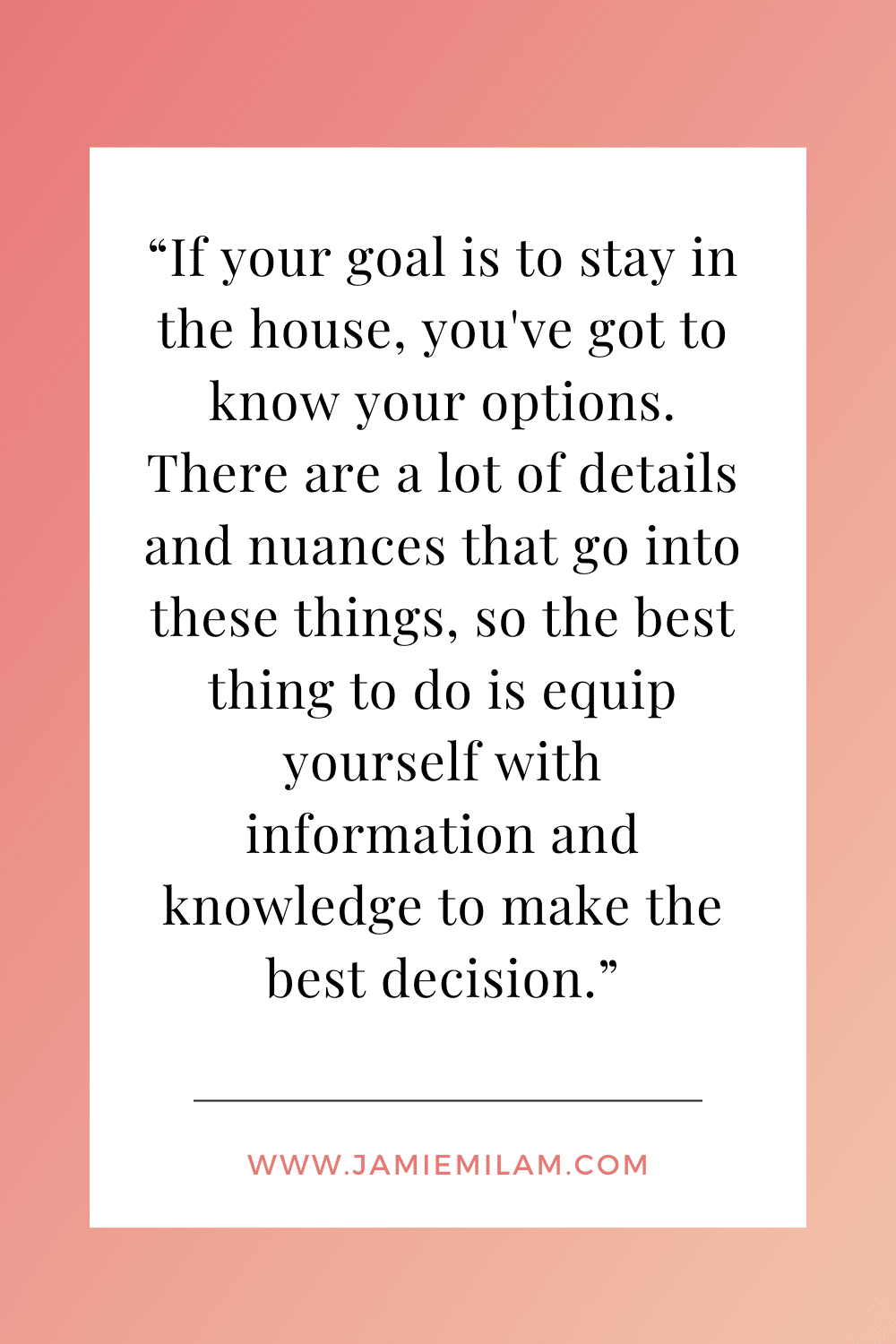THE BLOG
THE BLOG
*This website uses affiliate links which may earn a commission at no additional cost to you. As an Amazon addict and Associate, I earn from qualifying purchases, but I'm only recommending products I love!
Browse More Blog Posts:


Can You Keep Your House in a Divorce?
3 Post-Divorce Mortgage Options
Most women crave some stability and calm after their divorce. And not just for yourself, but for your kids. A big piece of this comes down to one thing: your house.
Our homes are a place of routine, comfort, and familiarity—all the things you want to maintain, especially for your children, after your divorce. Moving somewhere new can be a daunting process and, likely, you'd rather stay put.
But is it possible? What are your options? How can you stay in your house?
There's a misconception that the only option is to buy out your ex's half of the home equity and refinance the entire mortgage into your name alone.
But that's not your only option. There are other choices when it comes to keeping your home post-divorce. Pam Abirached, a Certified Divorce Lending Professional™ joined a recent episode of The Divorced and Determined AF podcast to discuss all these mortgage options.
Here we'll cover what those options are and how you can take practical steps towards what's best for your specific situation.
Keeping Your House Post-Divorce: Your 3 Mortgage Options
If your goal is to stay in the house, you've got to know your options. There are a lot of details and nuances that go into these things, so the best thing to do is equip yourself with information and knowledge to make the best decision. To help you begin to organize that information, there is a worksheet inside the P.E.A.C.E of Mind Initiative called "Can I Keep My House?" that will guide you through many of the steps so you can fill in your relative information.
Here's a high-level view of the three main mortgage options you have after a divorce. Take time to understand them, but also make a point to dig deeper and speak with a professional about your specific scenario (more on that below!).
Here are three mortgage options if you want to keep your home in a divorce:
Keeping Your House Post-Divorce: Your 3 Mortgage Options
If your goal is to stay in the house, you've got to know your options. There are a lot of details and nuances that go into these things, so the best thing to do is equip yourself with information and knowledge to make the best decision. To help you begin to organize that information, there is a worksheet inside the P.E.A.C.E of Mind Initiative called "Can I Keep My House?" that will guide you through many of the steps so you can fill in your relative information.
Here's a high-level view of the three main mortgage options you have after a divorce. Take time to understand them, but also make a point to dig deeper and speak with a professional about your specific scenario (more on that below!).
Here are three mortgage options if you want to keep your home in a divorce:


1. Keeping Your Spouse on the Mortgage
Keeping the status quo is your first option—both you and your spouse remain on the mortgage and you don't change the way things are set up after getting divorced. Of course, this requires a lot of compromise and ongoing communication, so it's an option that will only work for exes who remain on friendly, amicable terms.
Example of how it works: The wife stays in the home with her kids and keeps things as-is—the husband's name remains on the mortgage and deed. She is responsible now for meeting all mortgage payments.
The husband goes and purchases a new place, and can do so because he doesn't have a mortgage payment held against him. Legally, the house is awarded to the wife and she is expected to be solely responsible for the monthly payments, and the debt is excluded from the calculations for a new mortgage for the husband.
Why you might use it: Wife may not be able to qualify for a refinanced mortgage on her own.
Pros:
- Stay in your home.
- Keep the same mortgage payments.
- No refinancing; keep your low interest rates.
Cons:
- If the wife can't make the payments for some reason, it will impact the husband, too—he is still legally responsible for the home. That's why this option depends on a good relationship and trust that the payments will be made.
2. Refinance or Cash-Out Refinance
Your next option is to move the mortgage into your own name. There are a few ways to do this, and we'll base it around a real-life example:
Your house is worth $500,000 and the lien balances (amount owed) on the property are $200,000. That means there is $300,000 in equity and each partner has rights to $150,000. So, the partner who is staying in the home is obligated to pay a $150,000 buyout to the partner who is leaving.
The options to fund the buyout are:
- Refinance: This is the option to refinance the home so you have a new mortgage with a different principal amount and today's current interest rate. In this process, the partner who's leaving receives $150,000 in equity (paid to them in a lump sum, in installments or other assets are redirected to offset the full amount) and the partner who stays takes over the mortgage. That said, interest rates today are very high—around 8% compared to the 3-4% many people initially bought at—making it an unfavorable option for many people.
- Cash-Out Refinance: This option takes the current mortgage ($200,000 in our example) and adds the buyout portion ($150,000). You then need to see if you can qualify for a mortgage for that new amount of $350,000.
- HELOC: A Home Equity Line of Credit (HELOC) gives you access to the $150,000 equity you need. It's the best option if you can leave your mortgage as-is and then use this line of credit for the buyout funds. That would allow your existing mortgage to remain at its interest rate and only the buyout portion be interested at today's current rates.
Each of these options can work in different situations. The market and interest rates greatly determine what makes the most financial sense, as does your specific financial situation.
Eligibility Requirements to Refinance Your Mortgage
To be eligible for these options, you have to meet some specific criteria that depend on your career and income status:
- Employed with an income: If your regular work and income situation does not change after a divorce, you can be approved like any other mortgage. The mortgage broker will assess your situation and qualify you for a loan.
- Stay-at-home spouse: If you have been a stay-at-home parent without an income but are re-entering the workforce, a mortgage broker needs to re-establish your work history. Depending on what loan program you qualify for, it may be two or six months of paystubs before you can apply—it depends on each loan program and lender.
- Self-employed: If you work for yourself, loan officers require two years of work history to qualify you for a loan.
Along with your work income, another important piece of the puzzle is alimony or child support. If you plan to rely on these as income to qualify for a loan, you must meet the following conditions:
- Proof of receipt: You need to show you have received child support or alimony for a minimum of six months before application. These payments need to have been paid in full and on time, each month, to count as income.
- Duration: Alimony or child support must also continue for at least three years after you close on your home.
- Formal agreement: Written, legal documentation outlining payment obligations; this must be on file with the court and not an informal "handshake" agreement.
The time frames are especially important if you have a child who's older than 15 when your agreement is finalized—once child support stops at 18, you are not eligible to use it as income. You have to clear the six months prior and three years after thresholds to claim child support as income against your home mortgage loan.
If you do not meet these conditions, you cannot use alimony or child support as income to apply for a loan. Instead, you will have to qualify for a loan on your own income, credit score, and debt-to-income ratio.
3. Loan Assumption
The last option for your mortgage is a loan assumption. FHA (Federal Housing Administration) and VA (Veterans Affairs) loans are assumable by nature, but for anything else, you should call your loan servicer and confirm if your loan is assumable.
Your servicer is who you make payments to, not the loan officer who helped you set it up. Call your servicer and ask: "I am being awarded the house in my divorce. Will you allow assumption of this home?" Conventional loans may or may not be assumable, as it's at the discretion of each servicer—call and check it out! It's a free phone call and can make all the difference in affordability!
If your loan is assumable, one partner can take over the mortgage at the current interest rates and current principal balance. It's essentially picking up the loan as-is and putting it in someone else's name. You'll still need to remove them from the title of the property. Note that with an FHA loan, you still need to be qualified and eligible to take over the loan—a loan officer will evaluate your income, credit score, and debt-to-income ratio to ensure you're a good candidate.


An assumable loan still works with a buyout situation. From our previous example: You're eligible to assume the loan, so will take over the current principal of $200,000 and current interest rate (lower than today's rates, likely!). You still need to buy out your ex for $150,000, so you will look at options for a HELOC or other assets you have. If you do go the HELOC route, you'll still need to be able to qualify for the payments on your own, ensure there is enough equity in the home to qualify and take on the HELOC amount at today's current interest rate.
Pros:
- Can maintain the current principal and interest rates of the mortgage.
- If you need to buy out your spouse, it's a smaller portion.
- Less complex than refinancing the entire loan.
Cons:
- May not be an option for all loans.
Working With a Professional to Save Time, Stress, and Money
These mortgage options are complex. Depending on your unique situation, there will be a ton of moving parts you need to navigate to ensure the best possible outcome.
This is why it's so key to reach out to a Certified Divorce Lending Professional® who can help you navigate the timelines and elements of how to structure your mortgage agreement. The reality is that many real estate professionals do not specialize in divorce and don't know the nuances and don't know to suggest this to you. Unfortunately attorneys are not trained or licensed in the mortgage industry to be able to confirm if you can in fact qualify to keep the property, even if that's what you and your spouse agree on legally.
For example, a divorce attorney might say: "The wife is going to keep the house and has to refinance the husband in four months." But that doesn't give the six-month time frame to prove child support as income, so it's not an option for her anymore. If this is discovered after the agreement is finalized, guess what? You can now be held in contempt and will incur more legal fees - not a great start.
Or, a real estate agent might advise you to sell your home and buy something new without doing the due diligence to see if you're qualified for a loan. Perhaps the child care hasn't been consistent or isn't a documented situation, meaning you can't qualify for a new mortgage and move somewhere new. And yet your real estate agent doesn't know this and wants to move forward with the sale of your own home. You then likely identify another property to purchase but find out you can't and are left scrambling to find a rental for you, your kids and your three dogs.
Don't get yourself into these tricky scenarios. Instead, arm yourself with information and a divorce team of professionals to help you through. Reaching out to professionals early on will save you time, stress, and money because you'll be able to make informed decisions instead of being left in the dark.
You can check out the P.E.A.C.E. of Mind Initiative for more divorce resources or listen to episode 55 of The Divorced and Determined AF podcast to hear our in-depth conversation about mortgage options.
Consult with a Certified Divorce Specialist® like myself to understand your situation and the timelines and nuances of navigating mortgages. I can help you get a jump ahead of what your current home may be worth and what you'd need to do to prep it for market in case you aren't able to keep it. Contact me at [email protected] to start the conversation.
To knowing your options,



Save this post to come back to or share with a friend!
**Disclosure** This post may contain affiliate links and they are at no additional cost to you, though I may earn a small commission. Don't worry, I only recommend products or services that I have tried or believe would be of great value to you! All opinions expressed are those of my own!
Let’s Connect
So Many More Things to Share
The show that empowers women to make aligned decisions before, during & beyond divorce.
Where we are determined to empower women to live the lives they desire and deserve by making informed decisions & taking aligned action.
Inspiring and educating women on everything from mindset to real estate, divorce and entrepreneurial systems. I believe in the power of awareness and how it is instrumental on guiding each of us to make strategized decisions that align with our authentic self.
A cost effective way to renovate your space with professionally curated designs and available sourced products simulated into your space. Perfect for those who need the eye of an interior designer, without the full services & the cost that comes with it.
P.E.A.C.E. of Mind Initiative aims to be the resource center that inspires and supports women to feel Prepared, Educated, Assured, Confident, and Empowered before, during & beyond divorce. A growing resource of guides, checklists & professional directory.
There's More ▾
There's More ▾
Let me share the goods!
Come from contribution, that's a motto I've valued for years! So... that's exactly what I am to provide you, straight into your inbox each week! No fluff and all open-book. Inspiring you to practice awareness, value your authentic self, and implement strategic actions so you can create alignment in your world to live the life you desire and deserve!











